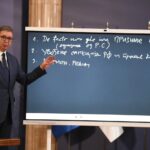- PACE endorses Kosovo’s accession to CoE
131 deputies of the Parliamentary Assembly of the Council of Europe voted in favor of the motion, 29 stood against it, and another 11 abstained.
Deputies from Serbia, as well as the majority of deputies from Spain, Cyprus, and Hungary, voted against it. Meanwhile, the majority of deputies from Greece, the country that does not recognize Kosovo, voted in favor of the move.
The conclusion and recommendation on the admission of Kosovo to the Council of Europe was prepared by the rapporteur from Greece, Dora Bakoyannis. Deputies from Serbia submitted several amendments, all of which were rejected. MPs from Italy and Hungary also tabled two amendments that stressed the need for significant progress in establishing the Association of Serbian Municipalities as a precondition for Kosovo’s membership. These amendments were also overruled.
The final decision on Kosovo’s membership must be made by the Committee of Ministers of the Council of Europe. The Committee is set to meet on May 16 and 17. It is believed that some European nations may demand that Kosovo demonstrate progress in establishing the Association of Serbian Municipalities before the CoE Committee of Ministers makes a final decision.
- Ruling party wins parliamentary elections in Croatia
According to tentative results, after data from almost all polling stations has been processed, the ruling party HDZ will receive 61 seats in the Croatian Parliament, SDP – 42, Domovinski pokret – 14, Most – 11, Mošemo! – 10, IDS – 2, Nezavisna platform Sjever -2, and Fokus/Republika coalition – 1.
Polling day was April 17.
On April 21, HDZ Chairman Andrei Plenkovic announced that negotiations on the formation of a new government will kick off on Monday, April 22.
“The message of the election is that HDZ along with its partners is a relative winner. We will form the government again. From Monday, we will start further negotiations with all those who are ready, according to the level of trust they have received from voters,” Plenković said. He said that there are already contacts with the “Homeland movement” (Domovinski pokret) and they will hold talks this week.
If a coalition of the center-right HDZ and the right-wing Domovinski pokret is created, Zagreb’s politics will become more right-wing, more oriented towards protecting the interests of Croatia and Croats. First of all, we can expect strengthening of the fight against illegal migration, rejection of part of European programs in the field of gender policy, more active protection and promotion of Croatian culture, the curbing of cooperation with the Serbian minority, and less active participation of Croatia in initiatives aimed at military aid to Ukraine.
- Republika Srpska (BiH) adopts own election law
The People’s Assembly of the Republika Srpska (NSRS) adopted the law on elections at an extraordinary meeting overnight April 19. The law provides that the elections in Republika Srpska shall not be run by the state bodies of Bosnia and Herzegovina. This role has been entrusted to election commissions appointed by the authorities of Republika Srpska.
The Republican Election Commission in RS is planned to take over the role of the Central Election Commission of Bosnia and Herzegovina in organizing elections in Republika Srpska.
The OSCE mission in Bosnia and Herzegovina emphasized in a comment to journalists that creating or entrusting the organization with holding elections to any body other than the Central Election Commission is a violation of the constitutional order of Bosnia and Herzegovina, and therefore of the Dayton Peace Agreement. The OSCE representation in Bosnia and Herzegovina appealed to the People’s Assembly of Republika Srpska to recall the recently adopted law on elections.
The adoption of the law on the elections of the Republic of Srpska, as previously announced by the President of the Republic of Srpska Milorad Dodik, was to be a response to the High Representative Christian Schmidt’s amendments to the law on the elections of Bosnia and Herzegovina. However, in connection with the latest events surrounding the planned review of the resolution on Srebrenica at the UN General Assembly, the adoption of the RS election law became part of a wider protest by the Republic of Srpska against all “western initiatives” and a demonstration of the seriousness of the intention to secede from Bosnia and Herzegovina.
- Referendum on removal of Albanian mayors in northern Kosovo fails
The removal of the leaders of the four northern municipalities required the support of 50 percent plus one vote, but only 253 of the 46,556 registered voters cast their ballots.
The leaders of the northern districts of Kosovo, Kosovska Mitrovica, Leposavic, Zubin Potok, and Zvecan were elected on April 23 2023, in elections in which only 3.5% of voters participated. Local Serbs took the initiative to remove who they believe are illegitimate heads of four municipalities, organizing the signing and filing of a corresponding petition in January. However, when the Kosovo authorities organized a referendum on the removal of mayors in the north, the leading party of the Kosovo Serbs, Serbian List, called for a boycott of the vote.
The boycott of the referendum showed that Serbs in northern Kosovo, backed by Belgrade, continue to reject cooperation with official Pristina. Constant tension in the relations between the Kosovo Serbs and the Kosovo authorities, between Belgrade and Pristina, leads to the degradation of the settlement process and to the deterioration of the security situation across the region.
- Albania government intends to revive defense factories
Tirana plans to restore defense production facilities dating back to the communist era by attracting foreign investors through a public-private partnership, Defense Minister Niko Pelesi said.
He noted that Albania has a “dysfunctional former military industry” and that the government intends to revive this sector, develop new clusters to meet the growing needs of the market, which “unfortunately” is growing due to conflicts. The minister emphasized that the Albanian government is open and waiting for proposals from international and local actors.
In his speech, the head of the Ministry of Defense mentioned three defense industry facilities – an underground plant in Polican, an explosives factory near Elbasan and a plant in Gramsh.
All three were built in 1962. With the restructuring of the Albanian armed forces after the fall of the communist regime in 1990, demand for the factories’ products fell sharply, which effectively led to the cessation of production. Currently, the production capacities at these enterprises are practically non-existent, which makes it difficult for the government to implement its ambitious plans.



